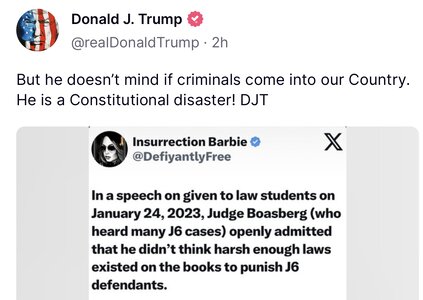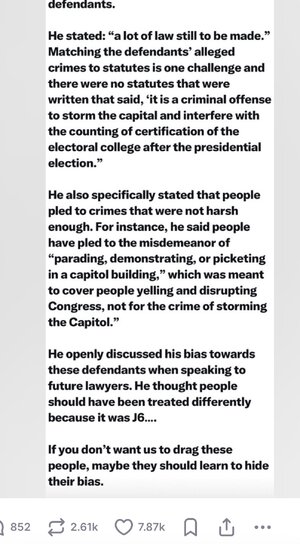Navigation
Install the app
How to install the app on iOS
Follow along with the video below to see how to install our site as a web app on your home screen.
Note: This feature may not be available in some browsers.
More options
You are using an out of date browser. It may not display this or other websites correctly.
You should upgrade or use an alternative browser.
You should upgrade or use an alternative browser.
Court orders being ignored or disregarded by Trump
- Thread starter superrific
- Start date
- Replies: 210
- Views: 6K
- Politics
- Messages
- 39,029
Homan would have fit right into Nazi Germany, IMO.
Homan, Trump's border czar, says administration won't defy judge's order on deportation flights

Homan, Trump's border czar, says administration won't defy judge's order on deportation flights
Tom Homan, Trump's "border czar," said the administration wouldn't defy court orders from challenges over its using the Alien Enemies Act to deport undocumented migrants.
“… According to Homan, all of those sent to El Salvador were known gang members, and -- he claimed -- most were members of Tren de Aragua, the Venezuelan gang that the Trump administration has labeled a terrorist organization.
"That plane removed 240 terrorists from the United States," Homan claimed, speaking exclusively on ABC's "This Week."
… Though Homan promised that the Trump administration would not defy court orders, he also said, "I don't care what the judges think as far as this case." …”
——
More of a mixed message than the headline suggests.
- Messages
- 39,029


Boasberg was more lenient towards J6 defendants than most other federal judges for this reason — he thought DOJ was stretching existing laws to cover some of the J6 behavior. So his bus was toward equal justice under the law (and not what MAGA usually label as “activist” judges). But sure, proof he is biased.
- Messages
- 1,758

America Is Watching the Rise of a Dual State
For most people, the courts will continue to operate as usual—until they don’t.
"... dictatorships create a lawless zone that runs alongside the normative state."
This is where we appear to be headed ...
- Messages
- 39,029

The Judiciary’s Last Stand
Trump’s campaign against the rule of law has ratcheted up dramatically.
“… Trump has used this authoritarian approach, undergirded by his legendary shamelessness, to break through every line of constitutional and moral defense—impeachment, elections, even the humiliation of arrest and conviction—that would otherwise restrain a rogue president (or, for that matter, any ordinary American felon). The center is not holding, and the flanks are collapsing. Congress is fleeing the field. The voters, many of whom long ago became inured to warnings about Trump’s contempt for the law, may be anxious about his behavior, but millions are sticking with him.
The president and his lieutenants still face one more set of defenses obstructing their march: the courts. If he can overcome the federal judicial system, then America’s worst modern constitutional confrontation will be over and Trump will be its victor.
Trump’s intentions in this barrage against the rule of law are clear, especially after he decided to go to the Great Hall of the Department of Justice earlier this month and shout them triumphantly from behind the presidential seal.
He celebrated his pardons of insurrectionists and seditionists. He gloated about stripping loyal citizens of their security clearances. He reeled through the names of Americans whom he called “thugs” and “bad people, really bad people,” who “tried to turn America into a corrupt Communist and Third World country.”
….But the president, who railed on for an hour, wasn’t content merely to criticize his opponents and tear up their clearance paperwork. Instead, he left no doubt in his belief that the machinery of government is now his to be used against his enemies:
This was not a policy statement or even a political speech. It was Trump’s plan of attack against the rights of his fellow Americans and the rule of law itself. …”We will expel the rogue actors and corrupt forces from our government. We will expose and very much expose their egregious crimes and severe misconduct of which was levels you’ve never seen anything like it. It’s going to be legendary. It’s going to also be legendary for the people that are able to seek it out and bring justice. We will restore the scales of justice in America, and we will ensure that such abuses never happen again in our country.
- Messages
- 39,029
“… And as if to underscore the administration’s militant, almost martial sense of defiance, a Trump adviser recently raised the previously unthinkable possibility that Trump could just defy the courts and then dare them to see who has more power.
The Judiciary’s Last Stand
Trump’s campaign against the rule of law has ratcheted up dramatically.www.theatlantic.com
“… Trump has used this authoritarian approach, undergirded by his legendary shamelessness, to break through every line of constitutional and moral defense—impeachment, elections, even the humiliation of arrest and conviction—that would otherwise restrain a rogue president (or, for that matter, any ordinary American felon). The center is not holding, and the flanks are collapsing. Congress is fleeing the field. The voters, many of whom long ago became inured to warnings about Trump’s contempt for the law, may be anxious about his behavior, but millions are sticking with him.
The president and his lieutenants still face one more set of defenses obstructing their march: the courts. If he can overcome the federal judicial system, then America’s worst modern constitutional confrontation will be over and Trump will be its victor.
Trump’s intentions in this barrage against the rule of law are clear, especially after he decided to go to the Great Hall of the Department of Justice earlier this month and shout them triumphantly from behind the presidential seal.
He celebrated his pardons of insurrectionists and seditionists. He gloated about stripping loyal citizens of their security clearances. He reeled through the names of Americans whom he called “thugs” and “bad people, really bad people,” who “tried to turn America into a corrupt Communist and Third World country.”
….But the president, who railed on for an hour, wasn’t content merely to criticize his opponents and tear up their clearance paperwork. Instead, he left no doubt in his belief that the machinery of government is now his to be used against his enemies:
This was not a policy statement or even a political speech. It was Trump’s plan of attack against the rights of his fellow Americans and the rule of law itself. …”
Trump’s leverage, the unnamed adviser toldRolling Stone, rests in his command of the armed forces: “Are they”—meaning federal judges—“going to come and arrest him?”
The dismantling of America’s constitutional government is under way.
The United States in 2025 no longer has an independently led national law-enforcement organization.
It no longer has a Department of Justice whose leadership is following the mission to serve the American nation and its Constitution.
The immense power of the Defense Department is in the hands of a talk-show culture warrior who intends to purge the officer corps of generals and admirals suspected of ideological unreliability.
The Congress is dominated by men and women who either agree with this authoritarian project or are too scared to oppose it.
The judges now stand alone—but their courage may not be enough to stop Trump.”
MOUNTAINH33L
Iconic Member
- Messages
- 1,055
Collateral damage in the war to own the libs.Is it wrong to believe that it's ok to deport anyone with a Real Madrid tattoo as an enemy of the state without due process?
Can we at least maintain that one special set of circumstances?
ZenMode
Legend of ZZL
- Messages
- 6,074
The issue appears to be that use of the alien enemies act may not be justiciable.Is it wrong to believe that it's ok to deport anyone with a Real Madrid tattoo as an enemy of the state without due process?
Can we at least maintain that one special set of circumstances?
Ok. I’m going to regret this. What do you think you mean by that?The issue appears to be that use of the alien enemies act may not be justiciable.
ZenMode
Legend of ZZL
- Messages
- 6,074
You don't have to regret anything, just look it up like I did.Ok. I’m going to regret this. What do you think you mean by that?
No. I actually am curious what you think you are saying.You don't have to regret anything, just look it up like I did.
ZenMode
Legend of ZZL
- Messages
- 6,074
Cool. Curiosity can lead to amazing things.No. I actually am curious what you think you are saying.
In this case, I kinda doubt it.Cool. Curiosity can lead to amazing things.
ZenMode
Legend of ZZL
- Messages
- 6,074
Agree.In this case, I kinda doubt it.
superrific
Master of the ZZLverse
- Messages
- 11,930
LololololThe issue appears to be that use of the alien enemies act may not be justiciable.
mynameisbond
Esteemed Member
- Messages
- 699
On Truth Social?You don't have to regret anything, just look it up like I did.
Share:


